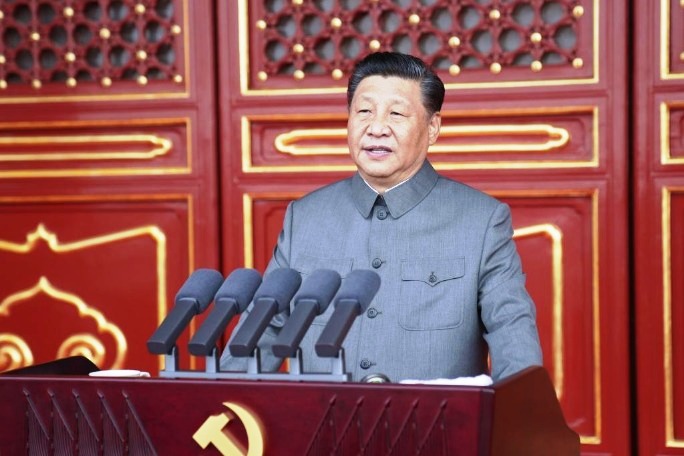Xi Jinping, modern China’s most powerful leader since Mao Zedong, wore a light grey suit which appeared to be identical to the one worn by the Communist Party founder in the famous portrait that adorns one side of Tiananmen Square. Is it like in the tale of ‘Emperor’s new clothes’ that Xi Jinping was creating an illusionary world for the people of China and reinforcing his own delusional world?
He delivered a defiant speech at an event marking the centenary of the ruling Communist Party and said Beijing would not allow “sanctimonious preaching”, by anyone. It comes as a rejoinder as China faces criticism over alleged human rights abuses and its crackdown in Hong Kong.
Growing calls to probe COVID-19 origin also cast clouds over China’s celebration of CCP centenary
But Xi Jinping is not one to be rattled by all this. The underlying theme of his speech was “even though there have been crises … the party has always been able to rebuild itself and lead China on the road to prosperity,”
The CCP revises Chinese history
In February, Xi issued a revised version of “A brief History of the Communist Party of China” — the official party history — to coincide with the centenary.
The latest edition of the CCP’s official history condenses the decade-long turmoil of the Cultural Revolution into three pages and downplays Mao’s atrocities, softening the party’s 1981 condemnation of the revolution.
The section on The Great Leap Forward is also shortened and only mentions “economic difficulties.” In comparison, the textbook from the CCP’s 90th anniversary still used the words “famine” and “famine deaths.”
The Great Famine during which tens of millions of people died under Mao’s economic policies is mentioned only once in the new textbook as a “natural disaster.”
Felix Wemheuer, a sinologist at the University of Cologne, says historiography has traditionally played “a very important role” for the party and its legacy as part of efforts to boost its “legitimacy.”
The 1989 Tiananmen Square protest is “dealt with very briefly,” and is described as a counterrevolutionary uprising seeking to abolish the socialist system and “had to be put down by the government,” Wemheuer told DW.
Xi Jinping in his address to the nation claimed that since China doesn’t oppress anyone, he warned that countries will “crack their heads and spill blood” if they come after China.
Can you imagine the gumption of the CCP (Chinese Communist Party) to talk when the persecution of Falun Gong practitioners has been ongoing since July 1999. There is no indication thus far of any policy change from the CCP, and we continue to witness the ruthless campaign of persecution against Falun Gong practitioners in China.
In order to “maintain social stability” the CCP announced a series of strict controls on the Chinese people in June, particularly in Beijing.
The CCP is afraid of losing power
The Chinese regime launched its brutal persecution to eradicate Falun Gong in July 1999, and it’s estimated that millions of practitioners have been detained, tortured, and killed over the past 22 years.
Regime officials believed they needed to escalate the persecution during the centennial to safeguard their power, according to Tang Jingyuan, U.S.-based China affairs commentator.
“The CCP regime has detained Falun Gong practitioners, petitioners, democracy activists, and even ultra-leftists who they don’t trust ahead of the centenary,” he told The Epoch Times on June 17. “It’s because Chinese leader Xi Jinping and the Beijing authorities are scared to lose power.”
Tang said the regime wants to consolidate its dictatorship, and Xi eagerly wishes to hold onto his totalitarian position. “In the past decades, Falun Gong practitioners have revealed the persecutions that they suffered in China, and exposed the crimes the CCP committed when faced with calls to end the persecution, inside and outside of China. This scares the CCP,” he added.
WION’s Palki Sharma decodes Xi Jinping’s speech on the 100th birthday of the Communist Party.
Please watch these two videos:
